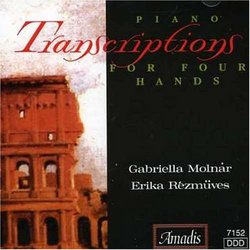| All Artists: Richard [Classical] Wagner, Franz [Vienna] Schubert, Johannes Brahms, Franz Liszt, Gabriella Molnår, Erika Rézmüves Title: Piano Transcriptions for Four Hands Members Wishing: 0 Total Copies: 0 Label: Amadis Original Release Date: 1/1/1997 Re-Release Date: 10/7/2000 Genres: Dance & Electronic, Classical Styles: Opera & Classical Vocal, Chamber Music, Historical Periods, Classical (c.1770-1830) Number of Discs: 1 SwapaCD Credits: 1 UPC: 747313715220 |
Search - Richard [Classical] Wagner, Franz [Vienna] Schubert, Johannes Brahms :: Piano Transcriptions for Four Hands
 | Richard [Classical] Wagner, Franz [Vienna] Schubert, Johannes Brahms Piano Transcriptions for Four Hands Genres: Dance & Electronic, Classical
|
Larger Image |
CD Details |
CD ReviewsExcellent Performances, Piano Duet Rarities, and two Masterp Hexameron | 09/02/2007 (5 out of 5 stars) "Amadis is a satellite bargain label of Naxos, and in addition to being one of my favorites, I also believe it is one of the most unique bargain labels in existence. I've collected many recordings from Seraphim, EMI Classics, Point Classics and Arcobaleno, but Amadis's recording quality and standard disc price of $2.99 makes it is a unique oasis within the sea of expensive recordings. I need only point to the recordings of Rachmaninov's, Liszt's, and Beethoven's piano music as stellar examples. This particular recording is an odd but fantastic assortment of piano duet works. Not unusual is Brahms's famous Haydn Variations and Hungarian Dances, which make a regular appearance on many Piano Four Hand/Two Piano discs. I've heard my fair share of performances of the Haydn Variations, but I was pleasantly surprised by the caliber of execution Gabriella Molnår and Erika Rézmüves pulled off here. They managed to give equal importance to the "head and heart" elements of the music; their playing possesses intellectual probity and yet unrestrained emotional energy. And they certainly exhibit more of the latter in the Hungarian Dances, which sparkle and sizzle with excitement. This piano duo really surpasses my expectations, though, with Schubert's Fantasy in F minor Op. 103, which I think is a piano four-hand masterpiece. The Fantasy was written in 1828 and embodies the same genius of the late Piano Sonatas of D. 850 to 960. The work brims with poignancy and purpose, and conveys that wonderful "Sturm und Drang" side of Schubert. I've only heard two other performances of this piece, but Molnår's and Rézmüves's playing is by far the most memorable. Their level of technique and dynamic control is masterful, but it's the interpretative touch and passion behind their performance which strikes me as being special. Throughout this 17 minute work they never tire of sewing a continuous expressive fabric with dramatic climaxes and melancholy lamentations. The inclusion of Tausig's and Horn's arrangement of Wagner's Die Meistersinger Prelude seems bizarre, but I tip my hat to those who took the decision to premiere this work. As Liszt's favorite pupil, a star piano virtuoso of his day, and even as a composer, Tausig was really a budding genius before his early death. I have no idea who A. Horn is, but he was apparently the collaborative arranger of this Wagner Prelude. Wagner's music always transferred well to the piano, especially when the transcriber followed Liszt's models. Perhaps wishing to emulate his master, Tausig crafted a convincing piano arrangement that happily digests the dense polyphonic texture of this Prelude. Two pianos capture the Prelude's ecstatic mood perfectly, and the sonority, reinforced by all of those powerful chords, is equal to that of the orchestral version. I might even suggest that Wagner's Die Meistersinger Prelude is more accessible under two pianos. Another singular choice on this recording is Liszt's Rákóczy March for two pianos, arranged not by him, but by Erno Szegedi, who worked with Liszt's piano duet arrangement of the March and extended it into a work for two pianos. I've never heard the piano duet or two piano arrangement before, but after hearing it here, I was won over by its wild frenzy. I find it amazing how versatile this piano duo is; at once they command the nuances and gentle Classical nature of Brahms, but here they eschew the conservative Brahms and allow Liszt's demonic and virtuosic take on the Rákóczy March to run amok, as it should. Bottom line: This is a CD for every Classical music collector. I've not seen a better deal for $2.99: two rarities recorded for the first time (Die Meistersinger Prelude and Rákóczy March), and superior interpretations of Brahms' Haydn Variations and Schubert's Fantasy. There's just no reason not to part with $3 for such a fine bundle of music." Old chestnuts and more Owen Norris | Mesa, AZ USA | 05/13/2007 (4 out of 5 stars) "The Schubert Fantasy in F-minor, along with the Brahms Variations on Haydn theme and six Hungarian Dances, are old chestnuts. What adds to the repertoire is the Prelude from Die Meistersinger von Nuernberg (R. Wagner) arranged by C. Tausig & A. Horn. Also, the Liszt Rakoczy March, arranged for two pianos by Erno Szegedi. This allows the listener to hear familiar themes from a different perspective."
|

 Track Listings (10) - Disc #1
Track Listings (10) - Disc #1